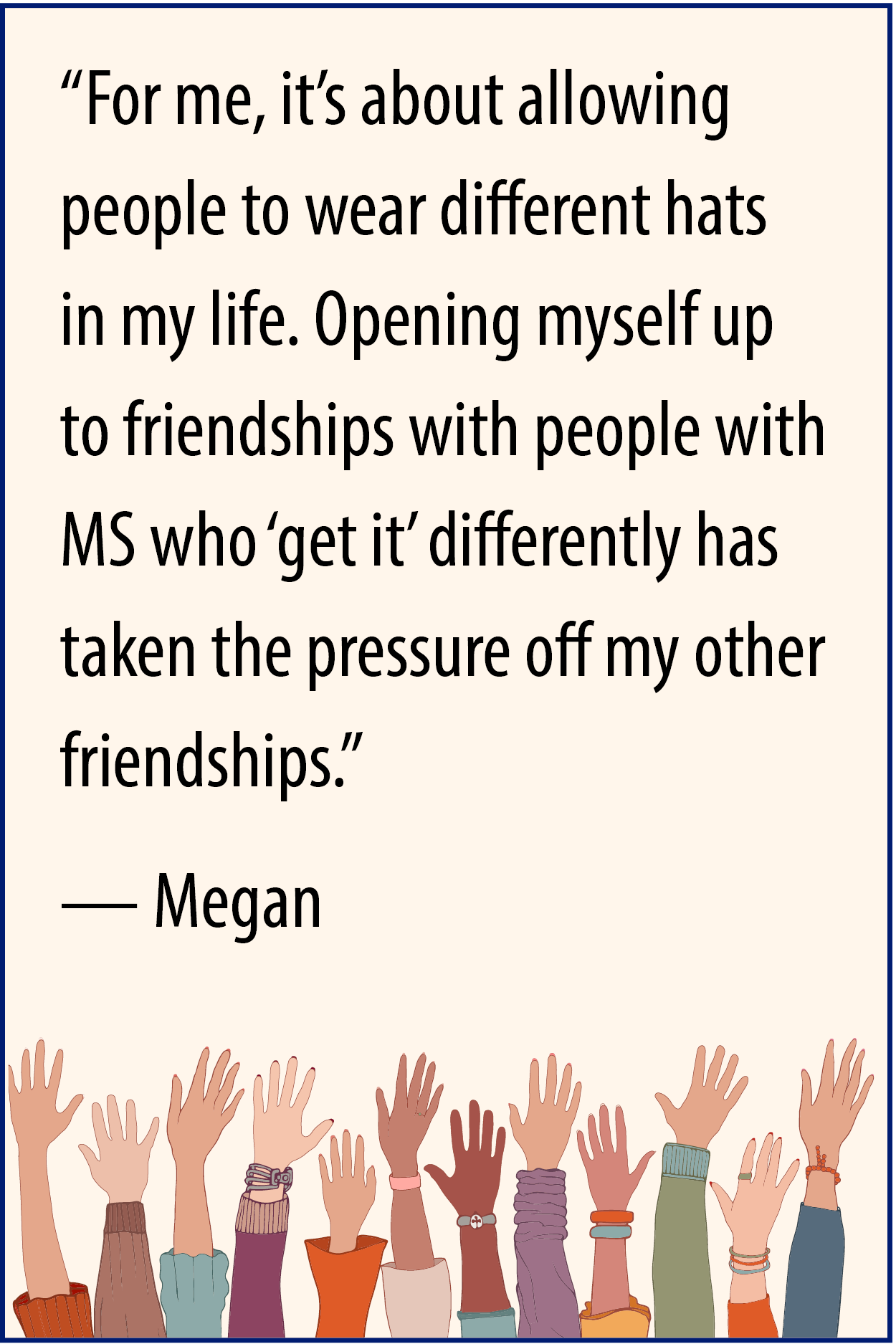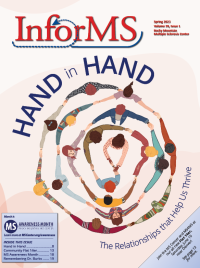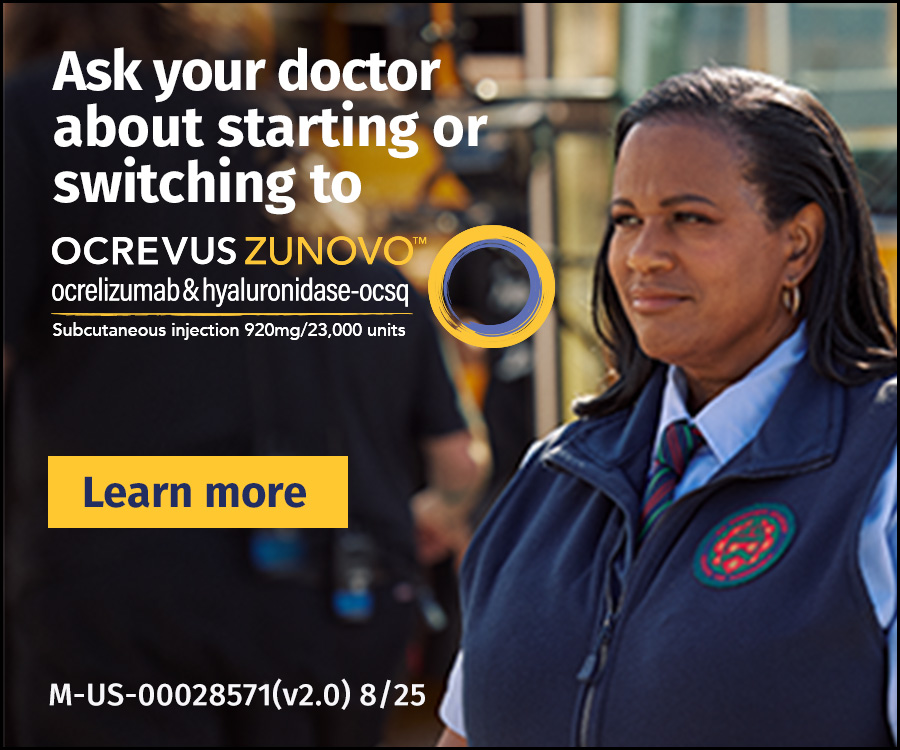InforMS: Could you please tell us about how you were diagnosed with MS?
Megan: I was diagnosed with MS two years ago. I’d had symptoms that started a couple of months earlier, but I’d chalked them up to stress of starting a PhD program at full speed and going into the holidays. When the symptoms didn’t go away, I eventually saw a doctor. She very casually suggested an MRI just to rule things out and it moved fast from there.
InforMS: What was it like to share your diagnosis with friends and family?
Megan: I live alone, so for a lot of the pandemic, it was just me and my kitty, and it was a lonely time. As I started telling friends and family, there were two main reactions: One was, “You’re only 30, you’re going to be fine, and there are so many good treatment options.” The other was being afraid to talk with me about it.
My Mom cried the first three or four times that we talked after I was diagnosed because she’s seen people throughout her life with MS, and she thought it meant something that it doesn’t necessarily mean now.
InforMS: What is the experience of living with MS like for you these days?
Megan: I now have good days and bad days. MS feels like another full-time job. In addition to my actual full-time job, in addition to living through a pandemic, in addition to being a girlfriend and a friend and a daughter and an aunt. But I think I’ve gotten to a better place. Physically, I know my symptoms and how to manage them. I had to relearn what it’s like to live in my body. That’s been a process and it’s different every day. For instance, I just had a Zoom meeting this morning and stood up and immediately knew that I wouldn’t be able to walk down the stairs until I gave myself a few minutes. Those kinds of things still surprise me.
But I think over time I’ve also started to find things that make it feel a little bit more manageable. I feel really supported by amazing doctors and a good care team that is very responsive to my questions. A lot of things I’ve worked on with my doctor help make my days go a bit smoother and make me more comfortable when I travel.
I’ve had to redefine some of my relationships and friendships. And I’ve started to create space for friendships with people who also have MS and we can talk about things in different ways.
InforMS: What has redefining relationships and friendships looked like for you and how has that been helpful?
Megan: I’ve found that many things come down to expectations versus reality. When I’d reached out to some of my closest friends and let them know I’m dealing with a symptom or struggling with something or having a hard day, their only response was, “Oh gosh I’m so sorry.” It’s hard because I don’t really want them to feel sorry, I just want them to know this is something I’m going through. I don’t know how to respond and suddenly I’m trying to make them feel better.
 I’ve had to decide that those relationships are not who I go to for MS support and that’s okay. It’s about redefining my own expectations of people and understanding that they might be struggling with their own set of things. Some relationships are better when I say, “I’m doing fine, everything is under control, I’ll let you know if there’s something serious.” And then knowing that I can go to other people who I know get it and who can talk to me about things in a different way.
I’ve had to decide that those relationships are not who I go to for MS support and that’s okay. It’s about redefining my own expectations of people and understanding that they might be struggling with their own set of things. Some relationships are better when I say, “I’m doing fine, everything is under control, I’ll let you know if there’s something serious.” And then knowing that I can go to other people who I know get it and who can talk to me about things in a different way.
That has been really challenging for me. I think we all want our best friends to be our best friends for everything, and it’s hard to realize that one person can’t always give you exactly what you need. For me, it’s about allowing people to wear different hats in my life. Opening myself up to friendships with people with MS who get it differently has taken the pressure off my other friendships.
InforMS: What was it like to start opening yourself up to friendships with other people with MS?
Megan: When I first started thinking about different support groups and resources, I was afraid of learning things I didn’t really want to know. The thought of hearing other people’s stories was a huge barrier for me. I now have a handful of friends with MS and that’s been extraordinary. I’ve started seeing MS more as a lifestyle shift rather than a sentence that I’m living through. Sometimes, I also talk with my MS friends before I talk with my doctor. “Hey, are you feeling these side effects? Did you experience this?” It’s so helpful to get that human element rather than only a medical one. It’s really helped me feel like a person with MS, as opposed to just a patient with MS.
I did start going to MS Young Professionals Network meetings about 6 months after my diagnosis. I was nervous about showing up and what I would see. One of the first meetings I went to one of the first people I met was using a walker and that was very uncomfortable because you start to wonder.
But soon, I found that it was easy to talk to people once we started talking. It’s just a different language that you can speak with one another. You realize you’ve learned a new vocabulary that none of your non-MS friends know. We all get it, and we can joke about it.
I have a friend who says, “Oh sorry it’s a stupid legs day,” whenever their legs go out. It’s funny because a doctor couldn’t say that to me. But when I heard them say it, I was like “Oh I know what that feels like.” And we can laugh. Laughing together is something that makes you feel a little more human and makes the experience more bearable. Those moments are good.
The other thing I did was sign up for a First Descents whitewater kayaking trip in Oregon trip last summer with 10 other people living with MS. It’s an incredible program and organization. The experience broke down some of the barriers because it put us in an environment where you’re noticing all the ways your body doesn’t always do what you want it to do. I’m really heat sensitive so being out on the river in the sun impacted me real fast.
The first day I really overdid it and exhausted too quickly. I had to get out early and sit on the beach for a little while. One of the guys on the trip who had been diagnosed longer than me hopped out of his kayak and sat down next to me and said “Yeah, we’ve all been there. You overdo it, you hit your limit… so what are you going to do differently tomorrow? Can you take your anti-fatigue medicine later in the morning, can you eat a bigger breakfast, did you drink enough water today? Maybe you could go for a swim before kayaking so you get cooled off?”
I realized that this wasn’t as big of a deal as I felt it was because we’ve all been there. That was a really freeing moment for me to stop beating myself up for not knowing how to manage things. But how could I have known? I’ve never gone through this before. Those moments just gave me space and permission for experimenting a little bit. That was powerful. It’s one of the best gifts that
First Descents gave me. It’s been awesome to lean into those resources and be gifted those friendships in return.
I’d had the mindset of “I’m going to fix everything and be this perfect MS patient and I’m not even going to notice it.” But these new friends gave me space and permission to be a person with MS stuff running in the background. You acknowledge it as you need to and just live your life the rest of the time.
InforMS: For non-MS folks in your life, what’s more helpful and supportive than saying “I’m sorry”?
Megan: For me it’s about being willing to ask questions. Maybe saying I’m sorry and then asking, “What’s that like for you?” “How are you feeling about all of that?” Or maybe texting again the next day and asking how I’m doing with that specific thing I was having yesterday.
I was talking with my Mom and she said “I don’t want you to think that when I see you all I think about is MS and so I don’t want to ask about it all the time. But if I don’t talk about it at all then you think I’ve forgotten or don’t realize what you’re going through and don’t support you.” So, that’s a difficult balance and I don’t have a good answer yet for what that mix is.
When I feel seen, cared for, and recognized is when someone just asks how I’m doing. I wear a knee brace occasionally and someone notices when I’m not wearing it and says, “Oh how’s your knee today?” It doesn’t have to be “How is your MS?” “How is treatment going?” It doesn’t have to be this really big thing where you have big conversations. It can be small things.
For example, my boyfriend will be walking with me, and we’ll approach a set of stairs. He’ll notice which side the stair rail is on, and he’ll trade places with me or kind of gently nudge me to the supportive side. He doesn’t make a big deal out of it, or suggest I take the elevator. He knows that I’ll do that if I need to. He knows stairs are a little more challenging for me, and he does something to make it a little bit easier for me without drawing attention to it. That approach has just made me feel really loved and taken care of. Just acknowledging that he recognizes that I’m thinking about it goes a long way in giving me support.
And there are some friends that don’t want to talk about it and don’t know how to address it. They’ve Venmo’d me a $5 Starbucks gift card on my MRI day to just say “I’m thinking of you…Get some coffee today,” because they know I’m stressed about it. Or will send me Door Dash the next day because they know I had my infusion that day. Just to show their care. People have different love languages and that’s been very thoughtful and helpful. It’s about those little gestures to say hey I’m there with you.
InforMS: How have people in your workplace supported you?
Megan: I work in study abroad so my biggest motivator for keeping my body healthy and going to PT and going to yoga and eating healthy is that I want to keep doing my job. I want to keep showing up for my students, and I want to keep creating these experiences.
I was open with my diagnosis early on with my colleagues because I was worried that if I hid it and then had a relapse, people might question my ability to do my job. In my mind, I want to be the one to set my limits. I wanted to communicate to my boss and team early on: “I’m telling you this so you know that I’m going to own it and if there’s a reason that I can’t do something, I’m going to tell you. Please don’t decide for me.” And they’ve been very respectful of that.
That’s been really empowering – to continue to do the work that I do. I actually got promoted after my diagnosis. That was a really great rubber stamp for them to affirm that they were confident in me.
It also creates a really good reason to build boundaries in. I don’t work when I don’t need to work because I need to be taking care of myself so I can do my job when I’m actually working. I’m intentional about when I work and when I take care of myself. I don’t want to work 60 hours a week and then be incapable of showing up for the students the way I want to or having any time for the rest of my life, my friends, my partner, or anything else that matters to me. It’s all about finding that balance and what works for you and your body.
Even just saying the words, “I have to prioritize my health” is simple, effective, and well-received. I think there’s truly been a big shift in many workplaces over the last couple of years. There is increased respect for managing your health and showing up as your best when you are healthiest and taking a day here or there to rest and to recover.
InforMS: What are the sorts of things you do to support your own health and well-being?
Megan: I’m not going to pretend like I have this all figured out and now I’m the healthiest person. When you get a diagnosis like this, you feel like you’re supposed to change everything – to become this model healthy person so you can be an inspiration to everyone. And that just hasn’t been my reality. During COVID, I really tried not to use it as an excuse to just sit on the couch and give up. I got some home health equipment – a treadmill and a bike. I like going for walks in my neighborhood, but when it’s icy that’s not going to happen, so I needed another option.
I’m not a cook, so healthy eating is a challenge. But I worked with a nutritionist and found that instead of making big jumps it was better to make little leaps. I’ve also utilized those subscription services so that I have a healthy microwavable thing in the freezer for when I’m absolutely maxed out when I get home when the alternative is not eating anything at all.
If there’s one thing that I wish that I had known when I was first diagnosed it’s that this doesn’t need to be the end of that version of you. There’s still room for all the things that make you who you are and that you want to make time for. I think you’d be surprised how much you get back when you just ask the questions – at work, of my doctors, with my friends and family. I’ve been really pleasantly surprised by the willingness of people to say, “Yeah that’s going to be a little trickier but we can make that work.” It’s so powerful to know that this is still something I can do even though I have MS.






